World Food Day is a day of action against hunger. On October 16th people around the world come together to declare their commitment to eradicate hunger by starting a conversation, learning and educating about food, farming, and hunger. This World Food Day celebrates family farmers for growing our food and caring for the earth. #Toast a Farmer!
———————————————————————————————————————————–
Berghahn is delighted to present some of its relevant titles:
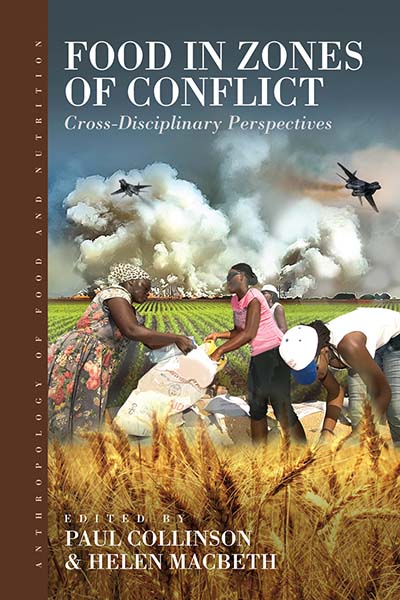 FOOD IN ZONES OF CONFLICT
FOOD IN ZONES OF CONFLICT
Cross-Disciplinary Perspectives
Edited by Paul Collinson and Helen Macbeth
Foreword by Hugo Slim
Volume 8, Anthropology of Food & Nutrition
The availability of food is an especially significant issue in zones of conflict because conflict nearly always impinges on the production and the distribution of food, and causes increased competition for food, land and resources Controlling the production of and access to food can also be used as a weapon by protagonists in conflict. The logistics of supply of food to military personnel operating in conflict zones is another important issue. These themes unite this collection, the chapters of which span different geographic areas. This volume will appeal to scholars in a number of different disciplines, including anthropology, nutrition, political science, development studies and international relations, as well as practitioners working in the private and public sectors, who are currently concerned with food-related issues in the field.
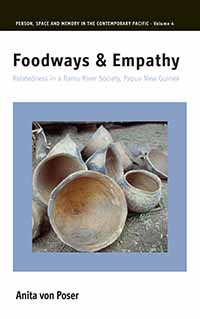 FOODWAYS AND EMPATHY
FOODWAYS AND EMPATHY
Relatedness in a Ramu River Society, Papua New Guinea
Anita von Poser
Through the sharing of food, people feel entitled to inquire into one another’s lives and ponder one another’s states in relation to their foodways. This in-depth study focuses on the Bosmun of Daiden, a Ramu River people in an under-represented area in the ethnography of Papua New Guinea, uncovering the conceptual convergence of local notions of relatedness, foodways, and empathy. In weaving together discussions about paramount values as passed on through myth, the expression of feelings in daily life, and the bodily experience of social and physical environs, a life-world unfolds in which moral, emotional, and embodied foodways contribute notably to the creation of relationships. Concerned with unique processes of “making kin,” the book adds a distinct case to recent debates about relatedness and empathy and sheds new light onto the conventional anthropological themes of food production, sharing, and exchange.
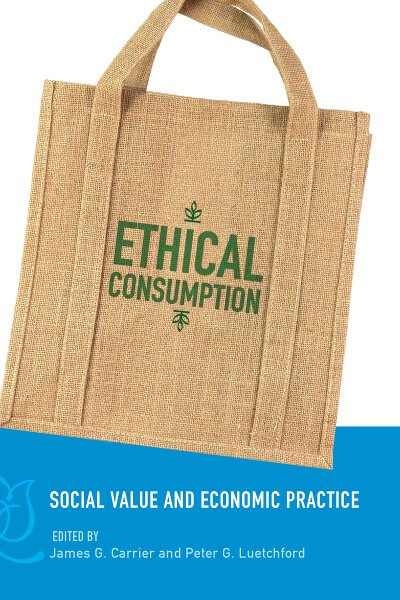 ETHICAL CONSUMPTION
ETHICAL CONSUMPTION
Social Value and Economic Practice
Edited by James G. Carrier and Peter G. Luetchford
Increasingly, consumers in North America and Europe see their purchasing as a way to express to the commercial world their concerns about trade justice, the environment and similar issues. This ethical consumption has attracted growing attention in the press and among academics. Extending beyond the growing body of scholarly work on the topic in several ways, this volume focuses primarily on consumers rather than producers and commodity chains. It presents cases from a variety of European countries and is concerned with a wide range of objects and types of ethical consumption, not simply the usual tropical foodstuffs, trade justice and the system of fair trade. Contributors situate ethical consumption within different contexts, from common Western assumptions about economy and society, to the operation of ethical-consumption commerce, to the ways that people’s ethical consumption can affect and be affected by their social situation. By locating consumers and their practices in the social and economic contexts in which they exist and that their ethical consumption affects, this volume presents a compelling interrogation of the rhetoric and assumptions of ethical consumption.
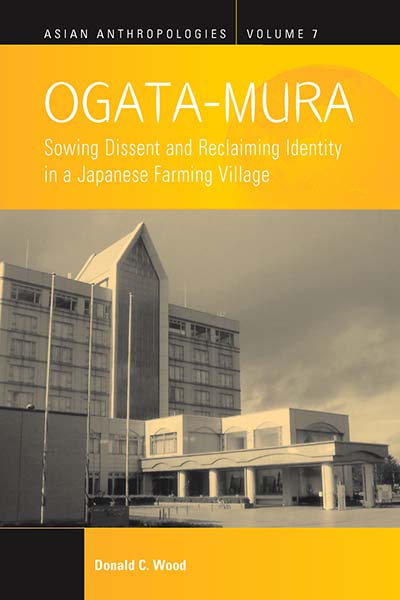 OGATA-MURA
OGATA-MURA
Sowing Dissent and Reclaiming Identity in a Japanese Farming Village
Donald C. Wood
Following the Second World War, a massive land reclamation project to boost Japan’s rice production capacity led to the transformation of the shallow lagoon of Hachirogata in Akita Prefecture into a seventeen-thousand-hectare expanse of farmland. In 1964, the village of Ogata-mura was founded on the empoldered land inside the lagoon and nearly six hundred pioneers from across the country were brought to settle there. The village was to be a model of a new breed of highly mechanized, efficient rice agriculture; however, the village’s purpose was jeopardized when the demand for rice fell, and the goal of creating an egalitarian farming community was threatened as individual entrepreneurialism took root and as the settlers became divided into political factions that to this day continue to struggle for control of the village. Based on seventeen years of research, this book explores the process of Ogatamura’s development from the planning stages to the present. An intensive ethnographic study of the relationship between land reclamation, agriculture, and politics in regional Japan, it traces the internal social effects of the village’s economic transformations while addressing the implications of national policy at the municipal and regional levels.
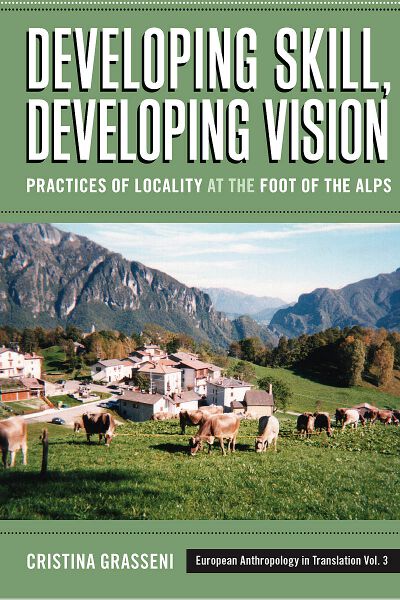 DEVELOPING SKILL, DEVELOPING VISION
DEVELOPING SKILL, DEVELOPING VISION
Practices of Locality at the Foot of the Alps
Cristina Grasseni
Translated from the Italian
Many people feel that the impact of technology and the pressure of the market economy on alpine communities leads to a loss of biodiversity, authenticity and cultural diversity, affecting animal husbandry, local food production, social networks and traditions. It is undeniable that “progress,” “development” and “integration” are transforming working routines, recipes for dairy production and patterns of communication in rural communities. This book explores the many tensions at the core of present local practices and debates in the Italian Alps, highlighting the many transformations undergone within skilled practice and cultural heritage as a result of commoditization, professionalization and technification, with a special focus on the ways in which this also means, quite literally, changing one’s vision of locality: of the landscape, of local products and of local animals.
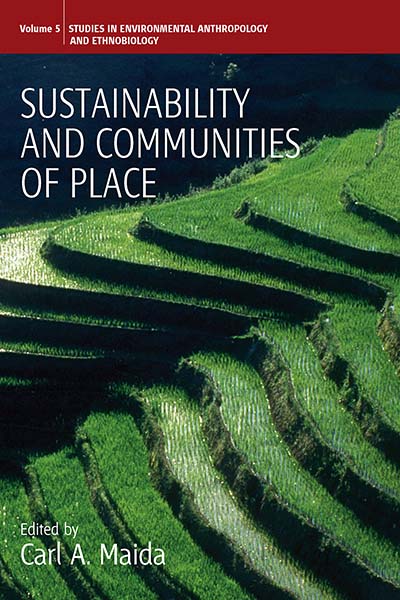 SUSTAINABILITY AND COMMUNITIES OF PLACE
SUSTAINABILITY AND COMMUNITIES OF PLACE
Edited by Carl A. Maida
The concept of sustainability holds that the social, economic, and environmental factors within human communities must be viewed interactively and systematically. Sustainable development cannot be understood apart from a community, its ethos, and ways of life. Although broadly conceived, the pursuit of sustainable development is a local practice because every community has different needs and quality of life concerns. Within this framework, contributors representing the disciplines of anthropology, sociology, geography, economics, law, public policy, architecture, and urban studies explore sustainability in communities in the Pacific, Latin America, Sub-Saharan Africa, Eastern Europe, and North America.
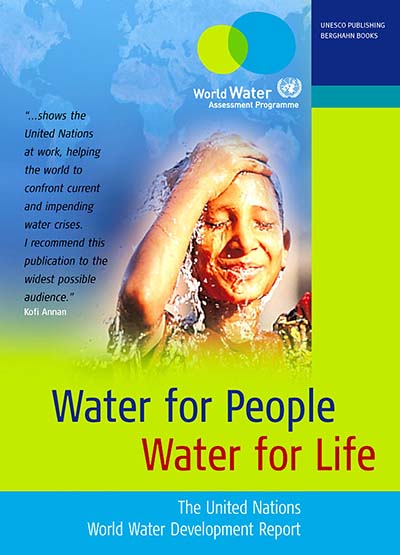 WATER FOR PEOPLE – WATER FOR LIFE
WATER FOR PEOPLE – WATER FOR LIFE
Published in association with the United Nations
With a foreword by Kofi A. Annan, Secretary-General of the United Nations
Based on the collective inputs of 23 United Nations agencies and convention secretariats, this Report offers a global overview of the state of the world’s freshwater resources. It is part of an on-going assessment process to develop policies and help with their implementation as well as to measure any progress towards achieving sustainable use of water resources.
enerously illustrated with more than 25 full-color global maps and numerous figures, the report reviews progress and trends and presents seven pilot case studies of river basins representing various social, economic and environmental settings: Lake Titicaca (Bolivia, Peru); Senegal river basin (Senegal, Mali, Mauritania, Guinea); Seine Normandy (France); Lake Peipsi/Chudskoe (Estonia, Russia); Ruhuna basin (Sri Lanka); Greater Tokyo region (Japan); and Chao Phraya (Thailand). It assesses progress in 11 challenge areas, including health, food, environment, shared water resources, cities, industry, energy, risk management, knowledge, valuing water and governance. Proposing methodologies and indicators for measuring sustainability, it lays the foundations for regular, system-wide monitoring and reporting by the UN, together with the development of standardized methodologies and data.
 THINGS FALL APART?
THINGS FALL APART?
The Political Ecology of Forest Governance in Southern Nigeria
Pauline von Hellermann
Governance failure and corruption are increasingly identified as key causes of tropical deforestation. In Nigeria’s Edo State, once the showcase of scientific forestry in West Africa, large-scale forest conversion and the virtual depletion of timber stocks are invariably attributed to recent failures in forest management, and are seen as yet another instance of how “things fall apart” in Nigeria. Through an in-depth historical and ethnographic study of forestry in Edo State, this book challenges this routine linking of political and ecological crisis narratives. It shows that the roots of many of today’s problems lie in scientific forest management itself, rather than its recent abandonment, and moreover that many “illegal” local practices improve rather than reduce biodiversity and forest cover. The book therefore challenges preconceptions about contemporary Nigeria and highlights the need to reevaluate current understandings of what constitutes “good governance” in tropical forestry.
———————————————————————————————————————————–
From Berghahn Journals:
 Environment and Society
Environment and Society
Advances in Research
Editors: Paige West, Barnard College, Columbia University and Dan Brockington, University of Manchester
The field of research on environment and society is growing rapidly and becoming of ever-greater importance not only in academia but also in policy circles and for the public at large. This growth reflects the urgency of debate and the pace and scale of change with respect to the water crisis, deforestation, biodiversity loss, the looming energy crisis, nascent resource wars, environmental refugees, climate change, and environmental justice, which are just some of the many compelling challenges facing society today and in the future. It also reflects the richness and insights of scholarship exploring diverse cultural forms, social phenomena, and political-economic formations in which society and nature are intricately intertwined, if not indistinguishable.
As a forum to address these issues, we are delighted to present an important new peer-reviewed annual: Environment and Society: Advances in Research. Through this journal we hope to stimulate advanced research and action on these and other critical issues and encourage international communication and exchange among all relevant disciplines.
Environment and Society publishes critical reviews of the latest research literature on environmental studies, including subjects of theoretical, methodological, substantive, and applied significance. Articles also survey the literature regionally and thematically and reflect the work of anthropologists, geographers, environmental scientists, and human ecologists from all parts of the world in order to internationalize the conversations within environmental anthropology, environmental geography, and other environmentally oriented social sciences. The publication will appeal to academic, research, and policy-making audiences alike.
